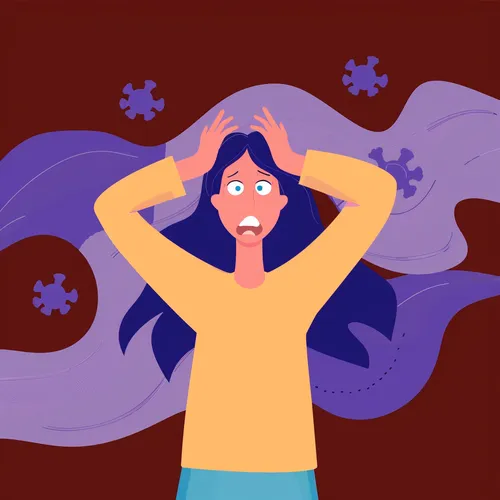What is Panic Disorder?
Panic disorder is an anxiety condition where you experience recurrent, unexpected panic attacks. Everyone feels anxious and panicky sometimes – it’s a perfectly normal response to dangerous or stressful situations. But people with panic disorder deal with feelings of stress, anxiety and panic on a regular basis, often without any apparent reason.
The Symptoms
Anxiety
Anxiety is that uneasy, worried feeling ranging from mild to severe. It includes worry, fear, and panic – the most intense form of anxiety. With panic disorder, you may begin to start avoiding certain situations because you are worried that they’ll bring on another panic attack. This “fear of fear” cycle can make your sense of panic worse and cause more attacks.
Panic Attacks
During a panic attack, you get a sudden rush of intense mental and physical symptoms that come on quickly without an obvious cause. Panic attacks are extremely frightening and distressing. Symptoms include:
- Racing heartbeat
- Feeling faint
- Sweating
- Nausea
- Chest pain
- Shortness of breath
- Trembling
- Hot flushes
- Chills
- Shaky limbs
- Choking sensation
- Dizziness
- Numbness or pins and needles
- Dry mouth
- Sense of dread or fear of dying
- Churning stomach
- Tingling in fingers
- Feeling disconnected from your body
Panic attacks typically last 5-20 minutes, although they can last up to an hour. The number of attacks depends on the severity of your condition – some people have them monthly, others weekly. While extremely scary, panic attacks aren’t dangerous and won’t cause physical harm. Most of these symptoms can also indicate other conditions, so you aren’t always experiencing a panic attack. For example, a racing heart could be due to low blood pressure.
When to Seek Help
See your GP if you’re experiencing panic disorder symptoms. Describe your symptoms, how often you get them, and how long you’ve had them. Your GP may do a physical exam to rule out other causes. It can be hard to open up, but try not to feel anxious or embarrassed.
You may be diagnosed with panic disorder when you have unexpected and regular panic attacks followed by a month or more of constant worry about having more attacks.
Treatments
Treatment aims to reduce your number of panic attacks and ease symptoms. The main treatments are talking therapies and medication, depending on your specific symptoms.
Talking Therapies
You can self-refer for cognitive behavioural therapy (CBT) or ask your GP for a referral. Your therapist will discuss how you react during panic attacks and teach ways to change your behaviour to stay calm. You may need to see your GP regularly during CBT to monitor your progress.
Medication
If suitable, you may be prescribed:
- An antidepressant like a selective serotonin reuptake inhibitor (SSRI) or tricyclic antidepressant
- An anti-seizure medication like pregabalin or, if severe anxiety, clonazepam
- Antidepressants take 2-4 weeks to start working and up to 8 weeks for full effects. Keep taking your medicines even if you don’t think they’re working unless your GP tells you to stop.
Referral to a Specialist
If your symptoms don’t improve with CBT, medication, and a support group, your GP may refer you to a mental health specialist like a psychiatrist or clinical psychologist. The specialist will assess you and devise a plan to manage your symptoms.
Self-Care Tips
During a Panic Attack:
- Stay where you are if that’s an option
- Try to breathe deeply and slowly
- Tell yourself that it will pass
- Focus on positive, peaceful imagery
- Remember it’s not life-threatening
Preventing Further Attacks:
- Read a CBT-based self-help book for anxiety (ask your GP for a recommendation)
- Try relaxing activities like yoga and pilates
- Learn breathing exercises
- Exercise regularly to reduce stress
- Avoid sugary foods/drinks, caffeine, alcohol, and quit smoking
Other Sources of Help
Panic disorder can hugely impact your life, but support is available. Speaking with others who have the condition or connecting with a charity may help. Some useful links:
Ask your GP about local panic disorder support groups as well. There are mental health services across the country that can provide help.
Complications
Panic disorder is treatable, so get medical help as soon as possible. If left untreated, it can escalate and become extremely difficult to cope with. You’re at higher risk of developing other mental health issues like agoraphobia or alcohol/drug problems.
Panic disorder can affect your ability to drive, so you must inform the Driver and Vehicle Licensing Agency (DVLA) as the law requires reporting medical conditions impacting driving.
Causes
Like many mental health conditions, the exact causes of panic disorder aren’t fully understood. It’s thought to be linked to a combination of factors:
- Traumatic or highly stressful life events like bereavement
- Family history of panic disorder
- Imbalance of neurotransmitters in the brain
Panic Disorder in Children
If your child shows signs of panic disorder, they should see a GP. After getting a medical history and physical exam to rule out physical causes, the GP may refer your child to a specialist. The specialist is likely to recommend cognitive behavioural therapy (CBT).
There are good resources online about anxiety disorders in children and mental health support services for young people if you need more information.
The key takeaway is that panic disorder is treatable with the right help. Don’t hesitate to seek support to break the cycle of panic and anxiety. With therapy, medication if appropriate, and self-care strategies, you can get your symptoms under control and improve your quality of life.
Photo “Panic” by Anthony Cunningham for Zoom Health
Zoom Health is a leading UK supplier of Home Health Tests and Earplugs





